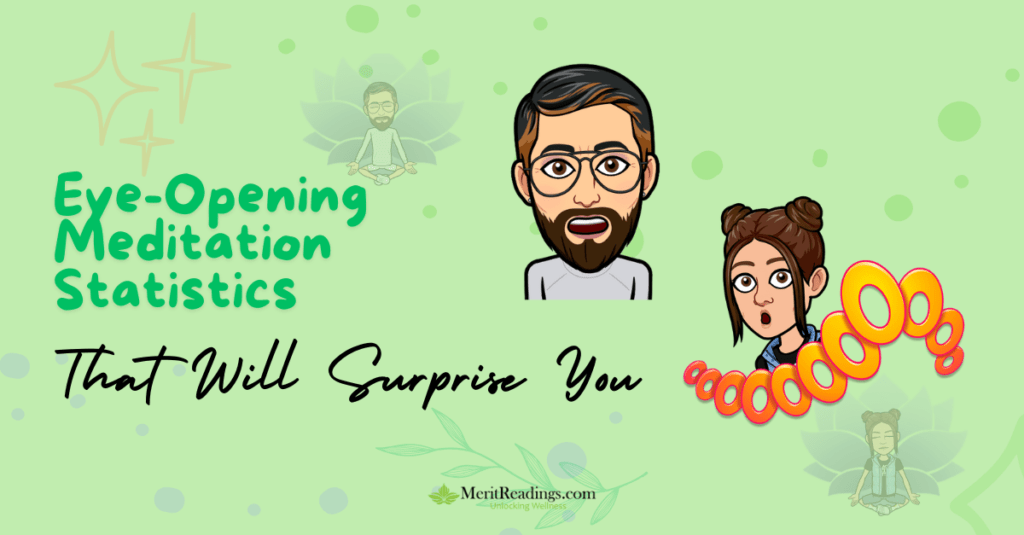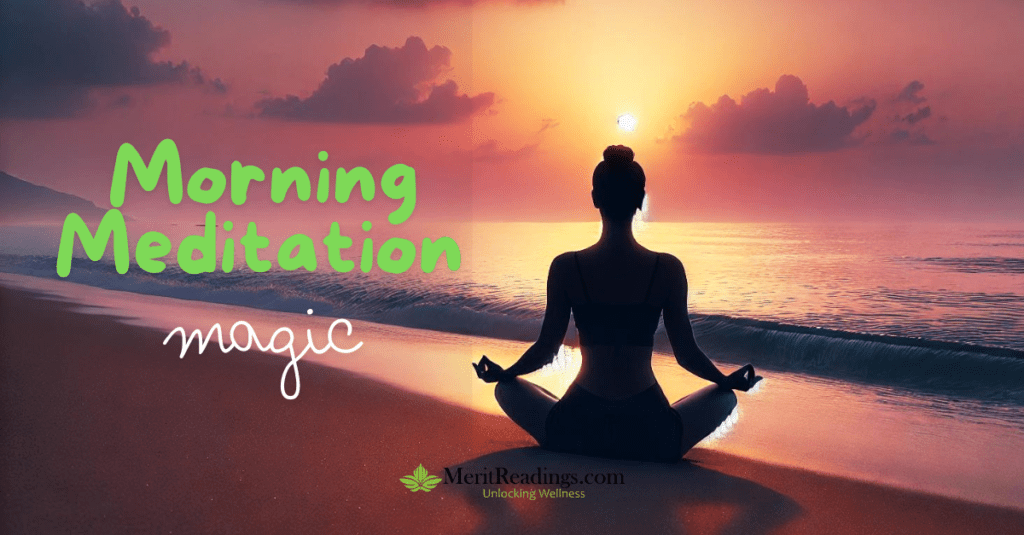Meditation isn’t just about sitting cross-legged and chanting anymore. People use it to improve their mental and physical health. But how effective is it really? With lots of research backing it up, meditation can do much more than just help you relax.
Let’s look at some eye-opening statistics on meditation benefits to see how powerful it can be. Want to know what these numbers show? Keep reading to find out!
What Is Meditation?

Meditation has been around for thousands of years, starting in ancient cultures that sought spiritual enlightenment. Nowadays, people use it to feel better and live healthier. There are different types of meditation, like mindfulness, transcendental, and guided meditation, and they are all getting more popular. Why? Because many studies now show that meditation helps improve your overall health and well-being.
Stress Reduction
One of the biggest reasons people try meditation is to reduce stress. And guess what? It really works! Here’s a look at some eye-opening stats:
- 2017 Review: Researchers reviewed 45 studies and found that meditation can greatly reduce stress. This shows that meditation works well to help with stress.
- Stanford Study: People who meditated regularly had a 30% drop in stress symptoms. This shows how helpful regular meditation can be for mental health.
- Headspace Report: After just 10 days of guided meditation, users felt 14% less stressed and 27% less irritable. These results show how quickly meditation can help improve well-being.
Meditation often works longer than other methods to relieve stress, like taking a vacation. Studies show that meditation works better for a longer time than many other methods. So, meditation could be a great choice for managing stress better and improving mental well-being.
Read the full Guide: The Incredible Benefits of Morning Meditation Revealed
Managing Anxiety
Meditation is a great way to help manage anxiety. Here’s what research shows:
- 2014 Meta-Analysis: A review of almost 1,300 people found that meditation can greatly reduce anxiety, showing useful results.
- Mindfulness Meditation Study: People with anxiety who practiced mindfulness meditation experienced a big drop in their symptoms. This supports how mindfulness experienced can help with mental health.
- Workplace Benefits: Companies that added meditation programs saw big changes, like less stress and anxiety among workers. This proves that meditation at work can improve well-being.
These findings suggest that if you have anxiety, meditation might be a helpful and easy way to feel better.
Meditation and Emotional Well-Being
Meditation has a strong impact on how we feel and our happiness. For example:
- Large Review Study: A review of over 3,500 people found that mindfulness meditation helps reduce depression. This shows how meditation can improve happiness (NCBI).
- Systematic Review: Another study found that meditation lowers suicidal thoughts and actions in people with major depression. This shows significant positive effects on happiness (PubMed).
These findings highlight how meditation can improve mood and emotional health.
People Also Read: The Amazing Spiritual Benefits of Meditation
Sharpening Your Mind: Attention and Memory
Meditation can also boost your brainpower:
- Neural Pathways: Studies show that meditation helps improve the brain’s pathways for focus and attention (Nature Reviews Neuroscience). This means meditation can improve your focus and overall brain health.
- Creativity and Problem-Solving:Meditating regularly can increase creativity and improve problem-solving skills (Journal of Cognitive Enhancement). This shows how meditation can positively impact productivity.
- Memory Boost: Just 13 minutes of meditation a day can help your attention and memory after eight weeks (PubMed). This supports how meditation can enhance your brain’s performance.
- For Older Adults: Meditation helps keep your mind sharp and slows down mental decline as you age (Journal of Alzheimer’s Disease). This shows how meditation can help maintain mental sharpness as you get older.
Meditation and Physical Health
Meditation is not only good for your mind but also helps with your body. Here’s some key physical health data that shows how meditation impacts your health:
- Pain Relief: Studies show that mindfulness meditation can help reduce how much pain you feel. A 2017 review found it helps manage pain effectively.
- Blood Pressure: Meditation can lower blood pressure. A 2015 study showed it can reduce systolic blood pressure by about 4.3 mmHg and diastolic by 3.11 mmHg.
- Immune System: Research suggests that meditation might make your immune system stronger. A review found that it lowers markers of inflammation, which supports overall health.
These findings highlight how meditation can improve physical health and enhance your overall well-being.
Read the full Guide: Discover the Mind-Blowing Physical Benefits of Meditation
Meditation and the Workplace
Meditation isn’t just good for personal health; it also offers significant benefits in the work environment. Here’s some key meditation success metrics that show how meditation impacts the workplace:
- Productivity Boost: Companies that used meditation saw a 120% increase in productivity, reflecting strong meditation productivity results. They also saw an 85% drop in the days employees missed work (Detroit News).
- Return on Investment: Businesses with mindfulness programs reported up to a 200% return on investment. This includes higher productivity and lower healthcare costs, highlighting positive meditation success metrics (Harvard Business Review).
- Workplace Relationships: Meditation helps improve relationships at work by fostering empathy and reducing conflicts (Journal of Applied Behavioral Science).
- Creative Thinking: Studies show that meditation enhances creative thinking, which can boost innovation and problem-solving (Journal of Experimental Psychology).
- Better Decisions: It helps you make clearer decisions, leading to better results at work (Nature Reviews Neuroscience).
- Psychological Safety: Mindfulness promotes empathy and reduces biases, creating a more inclusive and supportive work environment (Psychological Science).
- Employee Engagement: A positive organizational culture driven by meditation leads to higher job satisfaction and greater employee engagement (Journal of Organizational Behavior).
Easy to Start
One of the best things about meditation is how simple it is to begin:
- Accessibility: You can practice meditation anywhere, and you don’t need any special equipment. Whether you’re at home, at work, or even on the go, meditation is easy to fit into your day (NCBI).
- Variety: There are many different types of meditation, so you can choose one that fits your needs and preferences. From guided meditation to mindfulness practices, you can find a method that works best for you (Mindfulness).
Meditation’s ease of access and variety make it a practical and flexible practice that anyone can start.
Read the full Guide: How to Start a Meditation Routine
Conclusion
Meditation has many benefits supported by strong research. It’s a powerful tool for improving your overall well-being. It can help reduce stress and anxiety, boost brainpower, and manage pain. The meditation well-being figures and meditation stress relief statistics show how much meditation can positively affect your health.
Plus, meditation is easy to include in your daily routine and offers long-lasting benefits. Whether you want to handle stress better, sharpen your mind, or improve your health, meditation is worth trying. Give it a go and see how it can make a positive difference in your life!
FAQS
Q: How popular is meditation?
A: Meditation has gained widespread popularity, with 45-55% of Americans meditating weekly. Apps like Calm have also seen significant success, generating nearly $2 million in their first year.
Q: Is meditation scientifically proven?
A: Yes, research supports meditation. It lowers stress, improves attention, reduces anxiety and depression, and helps manage pain.
Q: What is the oldest evidence of meditation?
A: The earliest records of meditation go back to around 5000 BCE. Ancient cultures, including those in India, practiced meditation.
Q: How effective is meditation for stress relief?
A: Meditation is highly effective for stress relief. For example, a 2017 review found that meditation can greatly reduce stress. Users of the Headspace app reported a 14% drop in stress after just 10 days.
Q: Can meditation help with workplace stress?
A: Yes, meditation can improve workplace stress. Companies with meditation programs have seen up to an 85% drop in absenteeism and a 120% boost in productivity.
Q: Is meditation beneficial for children?
A: Yes, meditation can be beneficial for children. It can help them manage stress and improve focus, with around 5.4% of American children engaging in meditation.
Q: What are meditation well-being figures?
A: Meditation has many advantages. Guided meditation can lower your stress by 27% in 10 days and cut anxiety by 60% if you keep doing it.
Q: What are the potential risks of meditation?
A: While generally beneficial, meditation can sometimes trigger discomfort or unpleasant emotions. It’s important to approach it with a balanced perspective and seek guidance if needed.
References
- Transcendental Meditation and Longevity
- Meditation and Blood Pressure
- Meditation Market Size
- Mindfulness and Emotional Regulation
- Mindfulness Meditation for Anxiety
- Mindfulness for Depression
- Systematic Review of Meditation
- Neural Pathways and Meditation
- Memory and Attention
- Pain Management Review



